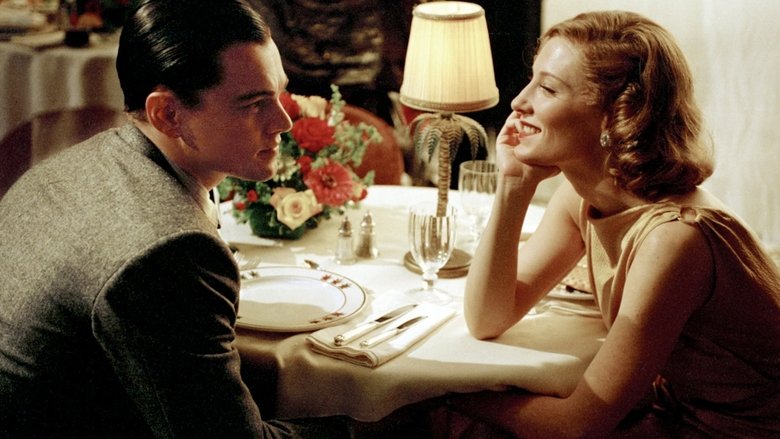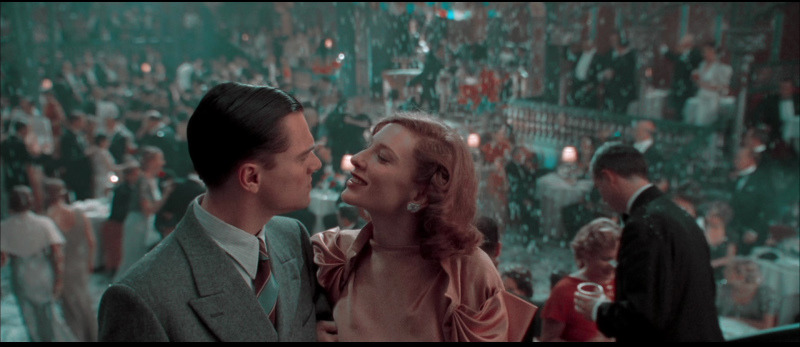← Back to Reviews

in

I think when you're portraying a famous public figure, you already have your work cut out for you in making the character your own rather than just dressing up as them. And the challenge is especially great when you're playing someone like Katharine Hepburn, one of cinema's most instantly recognizable screen presences, the challenge is even more pronounced, even if you're an actress the calibre of Cate Blanchett. Credit to her, she makes this tension essential to her performance, particularly in her breakup scene, which is the movie's best moment. ("Ha. I'm not acting.") For all the (extremely wrongheaded) criticism Martin Scorsese gets for the lack of female perspective in his movies, scenes like this prove he gets women, even if he's directing from a male vantage point.
Unfortunately, I think she's mostly an exception in this movie, which suffers from the flaws that seem to plague biopics. I've read about the amount of research that Leonardo DiCaprio did to prepare for his role as Howard Hughes, and while I think in later movies he's disappeared into distinct, magnetic characters (The Wolf of Wall Street, Once Upon a Time in Hollywood), the level of calculation that goes into all his choices is a bit too obvious here. There are times when his work rises above that level, usually depending on the strength of his co-star. One particularly good scene has him spar with a rival airline mogul played by Alec Baldwin, who uses his smugness to goad DiCaprio into spilling his secrets in an almost parodic display of dick-measuring (that their business is airplanes makes the metaphor that much more appropriate). But elsewhere, as when he argues with Kate Beckinsale's Ava Gardner, the movie devolves into two actors shouting under period-appropriate make-up, costumes and accents. As with many period movies of this scope, there are a great many cameos, and a number of them here are by actors who look distractingly modern, for lack of a better word.
To be honest, I'm no great fan of biopics (I struggle to think of many recent ones I've had any serious fondness for) and I think this movie's need to fit its material into that template hurts it significantly. I suspect Scorsese identified more than a little with Hughes as a creator and filmmaker (and like Hughes, he apparently sank his own money into the project to finish it), but based on a few of his movies, I suspect he has no great love for free enterprise, and the senate committee hearing scene in the third act, a sort of last hurrah to appease the genre's demands, comes off as a little obvious, as does the way Hughes' growing OCD lines up with the overall arc of the plot. (I'm sure many have pointed out how the pandemic has made Hughes much easier to empathize with in the latter respect, but I'm not sure that helped me enjoy this much more.) I understand Scorsese battled with producers heavily on this film and I wonder to what extent these narrative decisions were forced on him. Compare this to The Irishman and you can see how a sense of sprawl and langour in the narrative helped that movie immeasurably. Perhaps a less neat structure would have helped this one better evoke its subject's idiosyncrasies. (As to what kind of structure would be a thematically appropriate match for Hughes' OCD, I think you can argue in either direction.)
Scorsese's cinephilia manifests in the technical choices, some of which I struggled with. Visually the movie is supposed to evoke early Technicolor, with the first act in particular having the gaudy red and cyan look of the two-strip Technicolor process. I can't fault him for making use of technical innovations (perhaps in the spirit of the cinematic era he's evoking), but the CGI-enhanced colour scheme has an ugly digital veneer that I found extremely unpleasant to look at. Perhaps if this were achieved through more traditional methods, it might have had the tactility necessary to ground its artificiality. His cinematographic choices also make the CGI in the flight sequences look a little too obvious, although the scene where Hughes' plane crashes looks appropriately bruising, and otherwise look like something out of retro science fiction. I hate to come down too hard on this as it moves along quite nicely despite running almost three hours and usually has something halfway interesting going on in the meantime, but this is also close to my least favourite thing I've seen from Scorsese. But because he's a master filmmaker (and likely incapable of turning out something truly boring), this still muscles its way into a slight recommendation.
The Aviator (Scorsese, 2004)

I think when you're portraying a famous public figure, you already have your work cut out for you in making the character your own rather than just dressing up as them. And the challenge is especially great when you're playing someone like Katharine Hepburn, one of cinema's most instantly recognizable screen presences, the challenge is even more pronounced, even if you're an actress the calibre of Cate Blanchett. Credit to her, she makes this tension essential to her performance, particularly in her breakup scene, which is the movie's best moment. ("Ha. I'm not acting.") For all the (extremely wrongheaded) criticism Martin Scorsese gets for the lack of female perspective in his movies, scenes like this prove he gets women, even if he's directing from a male vantage point.
Unfortunately, I think she's mostly an exception in this movie, which suffers from the flaws that seem to plague biopics. I've read about the amount of research that Leonardo DiCaprio did to prepare for his role as Howard Hughes, and while I think in later movies he's disappeared into distinct, magnetic characters (The Wolf of Wall Street, Once Upon a Time in Hollywood), the level of calculation that goes into all his choices is a bit too obvious here. There are times when his work rises above that level, usually depending on the strength of his co-star. One particularly good scene has him spar with a rival airline mogul played by Alec Baldwin, who uses his smugness to goad DiCaprio into spilling his secrets in an almost parodic display of dick-measuring (that their business is airplanes makes the metaphor that much more appropriate). But elsewhere, as when he argues with Kate Beckinsale's Ava Gardner, the movie devolves into two actors shouting under period-appropriate make-up, costumes and accents. As with many period movies of this scope, there are a great many cameos, and a number of them here are by actors who look distractingly modern, for lack of a better word.
To be honest, I'm no great fan of biopics (I struggle to think of many recent ones I've had any serious fondness for) and I think this movie's need to fit its material into that template hurts it significantly. I suspect Scorsese identified more than a little with Hughes as a creator and filmmaker (and like Hughes, he apparently sank his own money into the project to finish it), but based on a few of his movies, I suspect he has no great love for free enterprise, and the senate committee hearing scene in the third act, a sort of last hurrah to appease the genre's demands, comes off as a little obvious, as does the way Hughes' growing OCD lines up with the overall arc of the plot. (I'm sure many have pointed out how the pandemic has made Hughes much easier to empathize with in the latter respect, but I'm not sure that helped me enjoy this much more.) I understand Scorsese battled with producers heavily on this film and I wonder to what extent these narrative decisions were forced on him. Compare this to The Irishman and you can see how a sense of sprawl and langour in the narrative helped that movie immeasurably. Perhaps a less neat structure would have helped this one better evoke its subject's idiosyncrasies. (As to what kind of structure would be a thematically appropriate match for Hughes' OCD, I think you can argue in either direction.)
Scorsese's cinephilia manifests in the technical choices, some of which I struggled with. Visually the movie is supposed to evoke early Technicolor, with the first act in particular having the gaudy red and cyan look of the two-strip Technicolor process. I can't fault him for making use of technical innovations (perhaps in the spirit of the cinematic era he's evoking), but the CGI-enhanced colour scheme has an ugly digital veneer that I found extremely unpleasant to look at. Perhaps if this were achieved through more traditional methods, it might have had the tactility necessary to ground its artificiality. His cinematographic choices also make the CGI in the flight sequences look a little too obvious, although the scene where Hughes' plane crashes looks appropriately bruising, and otherwise look like something out of retro science fiction. I hate to come down too hard on this as it moves along quite nicely despite running almost three hours and usually has something halfway interesting going on in the meantime, but this is also close to my least favourite thing I've seen from Scorsese. But because he's a master filmmaker (and likely incapable of turning out something truly boring), this still muscles its way into a slight recommendation.
